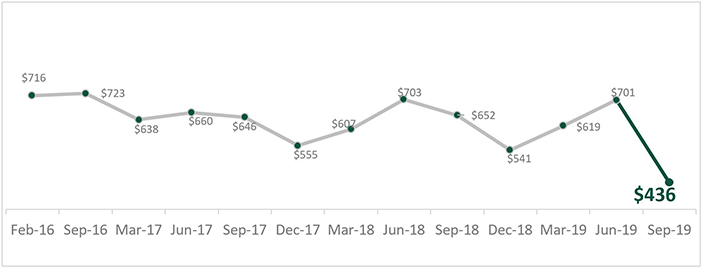Quebecers Find Themselves With Less Money Each Month, Half Concerned Their Ability To Repay Their Debts
Montréal, QC –October 28, 2019 – Despite the Bank of Canada stating it will keep interest rates stable until next year, more than half (51%) of Quebec residents say they are more concerned about their ability to repay debts than they used to be. This could be the result of declining wiggle room in household budgets. After paying all their bills and debt obligations, Quebecers say they have $436 left at the end of the month on average — a drop of $265 since June. This represents the lowest level since tracking began and the largest decline compared to other provinces. More than half (55%, +12 pts) say they are left with less than $200, including 3 in 10 (32%) who already don’t make enough money to cover all their bills and debt obligations (+4 pts).

The findings are part of the latest MNP Consumer Debt Index conducted quarterly by Ipsos. Now in its tenth wave, the Index tracks Canadians’ attitudes about their consumer debt and perception of their ability to meet monthly payment obligations.
Average Finances Left at Month-End

There has been a significant jump in the number of people in the province who are less than $200 away from not being able to make ends meet,” says Frederic Lachance, a Montreal-based Licensed Insolvency Trustee with MNP LTD — the country’s largest personal insolvency practice. “It’s alarming because it means any kind of unexpected expense could put more than half of Quebecers at risk of insolvency.”
It’s no surprise that, with less in the bank at month-end, many Quebecers’ don’t feel confident in their ability to cope with unexpected expenses. Seven in ten (67%) are not confident in their ability to cope with life-changing events — such as a divorce, unexpected auto repairs, loss of employment or the death of a family member — without increasing their debt.
“Our research shows most households do not have enough cash for inevitable life events like a car repair. It is important for households to create rainy day savings to buffer them from these types of expenses,” says Lachance, who recommends having at least three to six months of expenses saved in case of emergencies.
Quebecers may have fewer dollars left at month-end to buffer them from sudden expenses, but, somewhat surprisingly, they are growing generally more positive about their personal financial situations; at least in the shorter term. According to the index, 3 in 10 (30%) say their debt situation is better than it was a year ago (+2 pts). And an even greater proportion feel more positive about the future, with 4 in 10 (39%) expecting their debt situation will be better a year from now (+3 pts). More than 4 in 10 (45%) believe their debt situation will be better five years from now, although this is down 3 points since June.
“Many are positively swimming in debt and most don’t have a clear path to repayment, but the current holding pattern on interest rates may be giving Quebecers a sense of optimism. Still, our research shows many plan to take on even more debt this year to make ends meet,” says Lachance.
Just about half (49%) of Quebec residents say they don’t think they will be able to cover all their living and family expenses for the next 12 months without going further into debt, a 7-point increase since June. Furthermore, just half (50%) are confident they won’t have any debt in retirement, a six-point drop.
“Even if interest rates remain stable, that is not comforting to those already struggling to make their debt payments,” says Lachance.
A large portion of Quebecers (43%) are concerned about how rising interest rates will impact their financial situation, up two points since June. Forty-five percent agree if interest rates go up much more, they are afraid they will be in financial trouble (unchanged). Finally, a third (35%) are still concerned rising interest rates could move them towards bankruptcy (+2 pts).
“Even if you feel like your debt is out of control, if you have unmanageable credit card debt, a line of credit, mortgage, car loan — or all of the above — there is help available. Get professional advice right away to help develop a debt relief strategy,” says Lachance.
MNP LTD offers Free Confidential Consultations with Licensed Insolvency Trustees to help individuals understand their debt relief options. Licensed Insolvency Trustees are the only government-regulated debt professionals who offer a full range of debt relief options and can guarantee legal protection from creditors through Consumer Proposals and Bankruptcies.
About MNP LTD
MNP LTD, a division of the national accounting firm MNP LLP, is the largest insolvency practice in Canada. For more than 50 years, our experienced team of Licensed Insolvency Trustees and advisors have been working with individuals to help them recover from times of financial distress and regain control of their finances. With more than 230 offices from coast-to-coast, MNP helps thousands of Canadians each year who are struggling with an overwhelming amount of debt. Visit MNPdebt.ca to contact a Licensed Insolvency Trustee or use our free Do it Yourself (DIY) debt assessment tools.
About the MNP Consumer Debt Index
The MNP Consumer Debt Index measures Canadians’ attitudes toward their consumer debt and gauges their ability to pay their bills, endure unexpected expenses and absorb interest-rate fluctuations without approaching insolvency. Conducted by Ipsos and updated quarterly, the Index is an industry-leading barometer of financial pressure or relief among Canadians. Visit www.MNPdebt.ca/CDI to learn more.
The latest data, representing the tenth wave of the MNP Consumer Debt Index, was compiled by Ipsos on behalf of MNP LTD between September 4 – 9, 2019. For this survey, a sample of 2,002 Canadians aged 18 years and over was interviewed. The precision of online polls is measured using a credibility interval. In this case, the results are accurate to within +2.5 percentage points, 19 times out of 20, of what the results would have been had all Canadian adults been polled. The credibility interval will be wider among subsets of the population. All sample surveys and polls may be subject to other sources of error, including, but not limited to coverage error and measurement error.
A summary of the provincial data is available by request.

